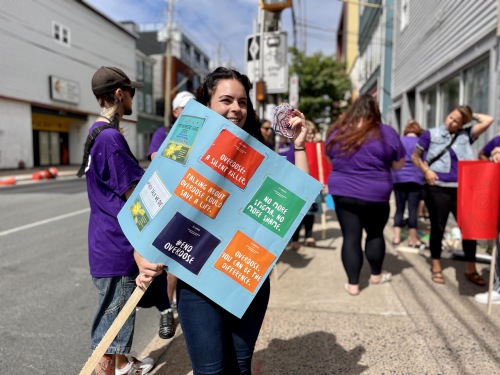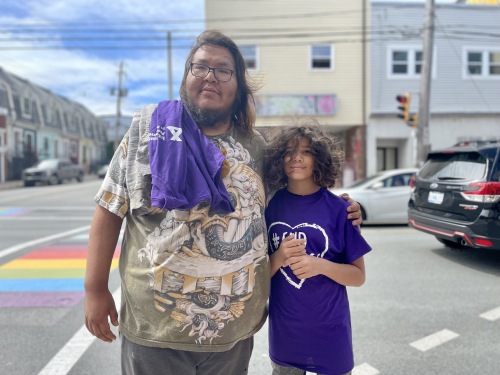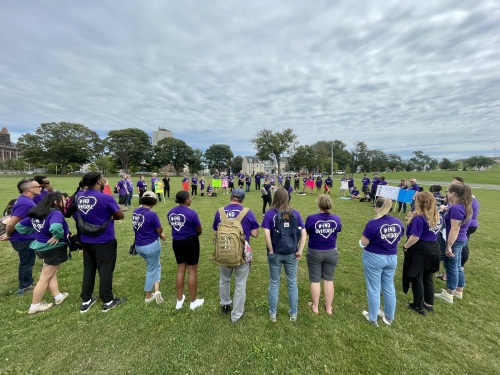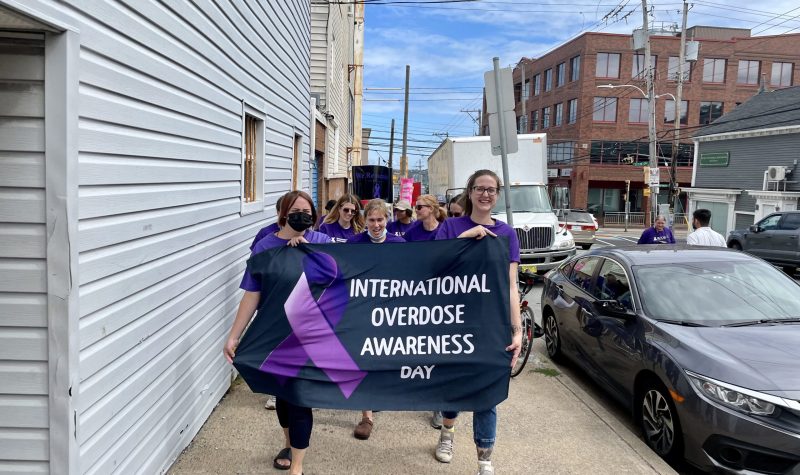Today, for International Overdose Awareness Day, Direction 180's housing clinic S.H.A.R.P. (Supporting Harm Reduction through Peer Support) hosted their ninth annual march and barbeque event. Community members gathered in front of the centre on Gottingen Street, and walked up to Halifax Common's Park.
Upon arrival, outreach workers and community members gathered in a large circle to share their call to action statements, take some moments of silence for all those who died of an overdose, as well as take turns to acknowledge and say goodbye to lost family members and loved ones by name.
Direction 180 has been a program of the Mi’kmaw Native Friendship Centre since 2001. Since then, they have developed and implemented over 50 health promotion and research initiatives with the aim of improving health and social outcomes for people who use substances.

Krista Miller is the coordinator of Direction 180's S.H.A.R.P.S. program. Photo by Sara Gouda.
Direction 180's S.H.A.R.P. Coordinator Krista Miller said it is important to take some time to remember the lives that were lost due to accidental opioid poisoning, as well as make some calls for action.
Miller also took the time to shed light on common misconceptions and share preventative measures.
"One thing for sure is that prescription use, as well as misuse, pose the same risk for opioid overdose. A method of prevention for overdose Awareness Day is to always carry naloxone. We have those kits available to give out anytime for free in Nova Scotia," said Miller.
Naloxone is a medication approved by the Food and Drug Administration (FDA) that is designed to rapidly reverse opioid overdose. It can restore breathing within two to five minutes, and can reverse or block the effects of fentanyl, heroin, morphine and codeine.
She added another way to prevent an overdose from happening is to be aware of the signs and symptoms. Signs and symptoms include blue lips, pale fingers, a "death rattle" sound as they're breathing and unconsciousness.
"A good way to try to wake somebody up if you think they may be experiencing an overdose is to actually threaten to give them naloxone. It is going to put them in such a bad state of precipitated withdrawal," said Miller.

Martin Sabourin from Pic Mobert First Nation, overdosed a few years ago and was saved by Naloxone. Photo by Sara Gouda.
Martin Sabourin from Pic Mobert First Nation showed up the event with his little sister to show support.
"A few years ago I overdosed as well. And it was the Naloxone that saved me. So I'm here to show my support because if it weren't for that drug, I wouldn't be here today. And just to sort of spread awareness," said Sabourin.
Sabourin said it is important to raise awareness about opioid use and Naloxone. He added his mother first had negative thoughts about Naloxone and addiction and had her perception change when her Martin overdosed.
"Don't do drugs. And honestly, it is okay to get help. And if you really want recovery, it will happen for you. So just don't give up on it."
Fidel Ross, a community outreach worker with MOSH (Mobile Outreach Street Health), a North End community health centre, said he attended to bring recognition to safe use and recognize those who lost their lives in the battle with addiction.
MOSH facilities different support to a lot of different organizations, and overdose awareness is one of their causes.

Outreach workers and community members gathered in a large circle at Halifax Commons to discuss their call to action, and take a few moments of silence for family members and loved ones who lost their lives by overdosing. Photo by Sara Gouda.
Ashton Manktelow has been the lead outreach worker for Mainline Needle Exchange for nine years.
He was the first speaker to share his experience, saying that in his work since 2009, almost 1,250 lives were lost to overdoses and that it is increasing in the last two years.
Statistics show a 96% increase in apparent opioid toxicity deaths during the first year of the pandemic (April 2020 – March 2021: 7,362 deaths), compared to the year before (April 2019 – March 2020: 3,747 deaths).
This is approximately 21 deaths per day. In the years prior to the pandemic, there were between eight (in 2016) and 12 (in 2018) deaths per day.
"I'm tired of hearing false promises from the government as our loved ones keep dying," said Manktelow.
His call to action included discussing harm reductions, implementing safe supplies, adding detox centres and safe injection sites, increasing organizations' funding, and adding more mental health programs.
"It's time to end the stigma behind substance use," said Maktelow.
Listen to the full interview below:


